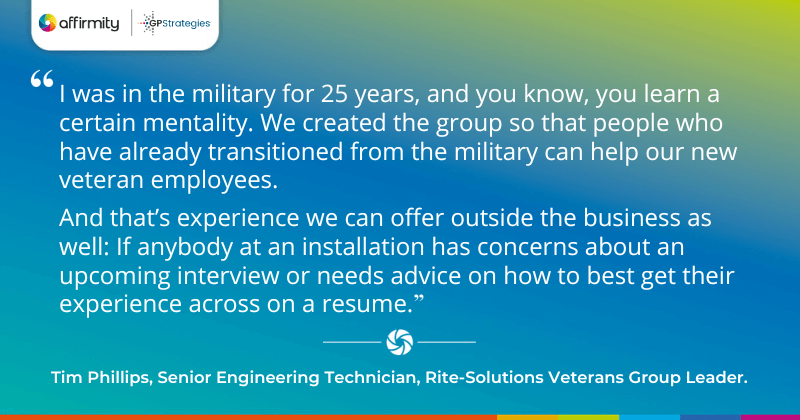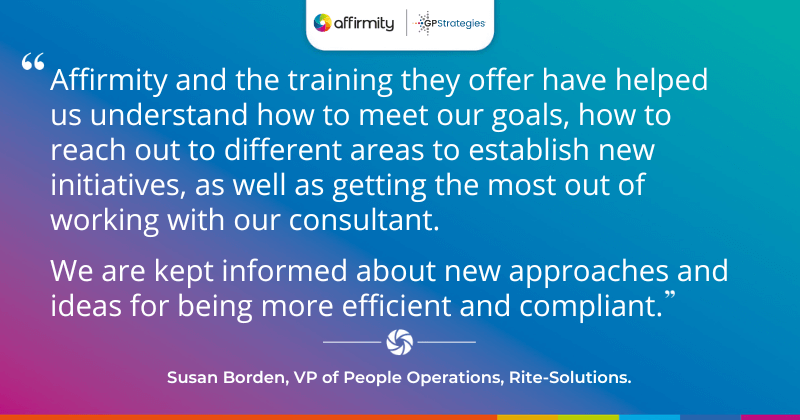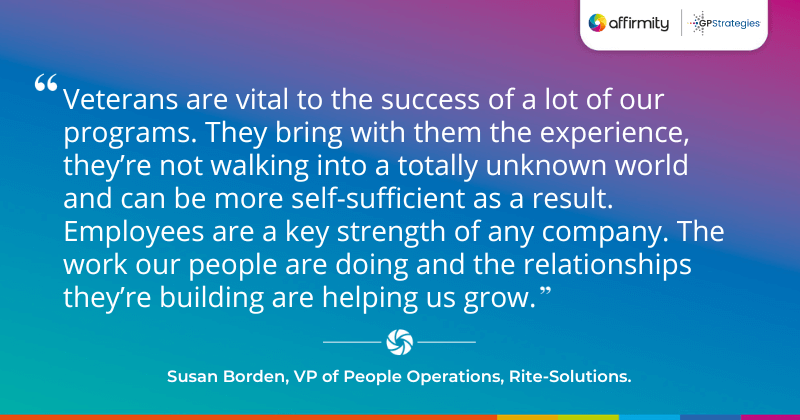Affirmity customer Rite-Solutions has been named as a platinum medallion winner by the HIRE Vets Medallion Program, a US Government initiative recognizing employers for their investment in recruiting, employing, and retaining military veterans. We met with Susan Borden, VP of People Operations and Tim Phillips, a Senior Engineering Technician and leader of Rite-Solutions’ Veterans Group, to discuss their recent initiatives.
Q: Please explain a little about Rite-Solutions’ work and the history of the organization.
Susan Borden: Rite-Solutions is a software development, systems engineering, information technology, and learning development company founded in the year 2000. We’re a veteran-owned business that has grown from a small, 13-employee firm supporting a commercial venture, into a 300-employee business working exclusively on federal contracts. A lot of our work is in the Rhode Island area, but we have people all over the country supporting different federal customers.
Our founders were particularly driven by the idea of creating a supportive and welcoming culture fueled by a veteran workforce and the unique skills that they could bring to the software and systems space. They really wanted to make something a little bit different from the culture of big companies that a lot of our people came from. We’ve maintained that character as we’ve grown, leading to various awards including our recent 2021 HIRE Vets Medallion Platinum Award.
LEARN ABOUT VETERANS REPORTING | ‘The 5 Ws of VETS-4212 Reporting’

Q: Why was Rite-Solutions selected for the 2021 Platinum HIRE Vets Medallion?
Tim Phillips: The initial criteria to apply for the HIRE Vets Medallion is, in the award year to either have at least 10% of your hires be military veterans, or to have at least an 85% retention of veterans hired in the year prior to the year of the award. Rite-Solutions met both criteria—in fact, 23% of our hires in 2020 were veterans.
2020 was a year in which we grew hugely as a government support contractor, and a big part of our growth was word of mouth. Our new hires often come from a mix of connections we made during our years in the military, our outreach programs and the positive work we do through our internal veterans’ group to help people with the transition to the civilian workforce.
We have a close-knit vision for our culture, which comes from our military background. It’s similar to my time working on submarines: everybody knows everybody regardless of rank—though you give the higher-ups appropriate respect, it’s a personable working environment.
We look out for each other. Last year, we had people in our veterans’ group affected by COVID. Both the group and the company itself sent flowers and messages of support to their families.
SB: We were very fortunate during COVID to be able to work uninterrupted and continue to grow the business. We hired 90 people with minimal attrition during 2020 despite the challenges COVID presented for anyone who works offsite. The kind of connectivity that was provided, that sense of being welcomed and feeling part of the team that Tim alludes to in our culture, was really important during that time. Transitioning to civilian life adds an extra layer to that.
So ultimately, it all comes down to the team we have and our employees, and their ability to reach out to people they’ve worked with in the past. It’s also about our veterans reaching those they haven’t previously worked with and creating a great experience for all who come on board.
MORE FROM THE BLOG | ‘Your Frequently Asked Questions and the Lessons We Learned From Working on OFCCP Audits’
Q: What are some of the ways that Rite-Solutions attracts and retains employees with an armed services background?
TP: We advertise at a lot of the military bases around here in Rhode Island and Connecticut—not just Navy, but the Army and other services. I usually send job listings over on a monthly basis, but we’re also keen to let them know that our veterans’ group offers advice to anyone adapting to civilian life.
I was in the military for 25 years, and you know, you learn a certain mentality: there are rules and regulations to follow, and coming to government contractor work, you’re completely out of your realm. We created the group so that people who have already transitioned from the military can help our new veteran employees.
And that’s experience we can offer outside the business as well: if anybody at an installation has concerns about an upcoming interview or needs advice on how to best get their experience across on a resume. Even if they’re not planning on working for us because they plan to go across the country.
If they do apply to work with us, whether we’ve worked with someone before or not, we can easily transition them into our company.
SB: Their background will be similar, regardless of which branch they’ve worked in.
Of course, another key area for us is that we offer a robust training and certification program, a mix of what is required for the work and for general professional development. It helps us as a company too. When we’re bidding for new work, we need to be able to show the strengths and skills we have as a company in terms that the market understands.
TP: Rite-Solutions offers a tuition assistance program—as long as it’s a college course, certification, or degree that could be utilized by the company, we will reimburse a percentage of that tuition. This also frees up former military employees to transfer the GI Bill they earn during service to a family member.
We’re flexible with our schedules to allow this learning too: we’ll work with them to move work around the requirements of the course. Military people often don’t get the chance to get a degree while in service. You’re often gone for long periods of time and it’s difficult to be present for the required class time. There’s a lot of reasons why companies offering tuition and training assistance are going to be extra attractive to current and future employees. So they can maybe become a fiber-optic technician, or move into cybersecurity for example, and that’ll benefit both us and them.

Q: How has the work of veterans made a difference to your business?
TP: It can be very challenging to hire civilians to work on the kinds of contractor or subcontractor work we do for the government. For example, they often don’t get the limitations of military environments. So maybe they’re used to working on oil rigs, and they don’t get that on a submarine they’ll be limited in terms of the number of screens or the physical space for a key piece of equipment.
It’s therefore much easier to hire veterans for this kind of work. We can say “when I was an operator, this really didn’t work the way it should” and bring that insider insight that others couldn’t bring. We can also help better bridge the divide and help people on the government side understand the issues and environment by arranging a tour and talking them through the problem. Plus, this all helps the transition period of our veterans, because they’re working in familiar environments and continuing to contribute.
In general, I’d say that military personnel are a source of very intelligent labor, people who have proven themselves able to respect and follow rules. If you give them a deadline, they value doing it right and on time.
SB: Veterans are vital to the success of a lot of our programs. They bring with them the experience, they’re not walking into a totally unknown world and can be more self-sufficient as a result. Employees are a key strength of any company. The work our people are doing and the relationships they’re building are helping us grow.
Q: How would you describe the challenges that businesses within the software and systems space face with respect to properly integrating veterans?
TP: In general, it’s important to acknowledge that a lot of veterans were operators rather than designers per se. So there’s a certain amount of job tailoring required to invite military personnel to come in and understand exactly what a project demands, and how their existing knowledge will be helpful. As we said before, veterans often haven’t yet had a chance to get some of the degrees they have the potential to earn, or to work with certain software applications, though through training that will come in time.
SB: There may need to be accommodations made in terms of equipment for veterans with disabilities. Things like standing desks, certain keyboards or chairs, accessibility software and hardware such as screen magnifiers, screen readers or voice recognition software. This can be a little more challenging if our people are working offsite, because it often won’t be our equipment. So it’s important to know how to work with customers to find a good solution.
TP: It’s important to find a solution that works for the individual, and to not work on assumptions. It’s a conversation led by the individual, but we can always pull them aside and ask them if they have any issues or concerns.
YOU MAY ALSO FIND USEFUL | ‘5 Inclusive Mindsets That Create Better Businesses for Employees With Disabilities’

Q: How has Affirmity helped you reach the goals that led to your selection for the HIRE Vets Medallion?
Susan Borden: Affirmity works with us on both the VETS-4212 and EEO-1 reports as well as the annual creation of our overall affirmative action program. This work establishes our processes and procedures to ensure our compliance and measure and monitor our affirmative action goals. I also feel that Affirmity does a really good job with their training—I try to attend all the training they offer. While some of the training is veteran-focused, there are a wide variety of topics presented annually, all of which are beneficial in managing our affirmative action responsibilities.
Affirmity and the training they offer have helped us understand how to meet our goals, how to reach out to different areas in different ways to establish new initiatives, as well as getting the most out of working with our consultant.
There are always good conversations about making sure we’re doing the best outreach we can, and we are kept informed about new approaches and ideas for being more efficient and compliant. I feel we have a great relationship and appreciate Affirmity’s proactiveness and support in reaching our goals.
Q: To close, how can organizations (both in your industry and beyond) do more to attract veterans and help them reach their full potential?
TP: Go to nearby installations. Most of them have job fairs, so you can go and meet a lot of the veterans face to face. Installations also have a required class that everyone getting out of the military is required to take. This involves mock interviews, resume advice, and that kind of thing, so if you advertise with them you’ll start to build awareness. It’s a lot of word of mouth: veterans are tight-knit and word gets around when you’ve hired them and they’ve had a great experience working for you.
It’s worth saying too, that location matters a lot. Veterans establish themselves in the local community while they’re serving. They probably have a house there, their kids are already in certain schools. If you’re building a business around veteran expertise, you’ll want to bear that in mind and build your business closer to where they are.
SB: It’s also important to go to area universities and work with the veterans’ groups there, to cover another key path in the transition to civilian life. In both areas, it pays to offer the kind of resume and back-to-work advice that we mentioned previously.
MORE CUSTOMER Q&As FROM THE BLOG | ‘How Comerica Builds Momentum in Its DE&I Strategy [Q&A]’
